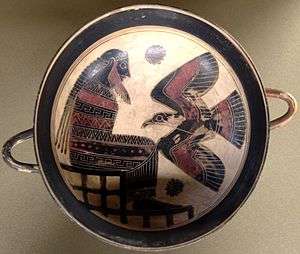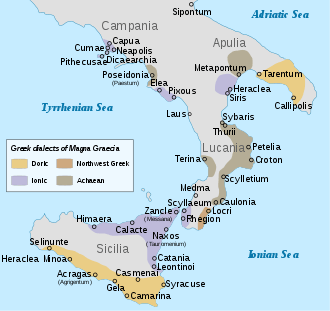Gerousia
The Gerousia (γερουσία) was the Spartan council of elders, which was made up of men over the age of sixty. It was created by the semi-legendary Spartan lawgiver Lycurgus in the seventh century BC, in his Great Rhetra ("Great Pronouncement"). According to Lycurgus' biographer Plutarch, the creation of the Gerousia was the first significant constitutional innovation instituted by Lycurgus.[1]
| Sparta |
 Zeus on his throne with his eagle This article is part of the series: |
| Great Rhetra Laws of Lycurgus Politeia |
|---|
| List of Kings of Sparta Gerousia Ephorate Apella Spartiates Perioeci Helots Agoge Syssitia |
|
Spartan army • Other Greek city-states • Law Portal |

Membership
The Gerousia consisted of thirty members in total, of whom twenty-eight had to be over the age of sixty, and the remaining two members were the two Spartan kings, regardless of their age. Other than the kings, the members of the Gerousia (known as gerontes), served for life. Gerontes were elected by voice vote of the people, with the winner determined by a group of men in a separate building who would judge which shouts had been the loudest without knowing which candidate received that shout.[2] These elected members included a number of members of the two Spartan royal 43 houses, and membership was probably restricted to aristocrats.[3]
Function
The Gerousia had two major roles. It debated motions which were to be put before the citizen assembly, with the power to prevent any motion from being passed on,[4] and functioned as a Supreme Court, with the right to try any Spartan, up to and including the kings.[3] The Great Rhetra suggests that it had the power to overturn decisions made by the Spartan assembly.[5]
Notes
- Cartledge 2003, p. 60
- Plutarch
- Cartledge 2003, p. 61
- Holland 2009, p. 81
- Cartledge 2003, p. 62
References
- Cartledge, Paul (2003), The Spartans: An Epic History, London: Pan Books, ISBN 978-1-4472-3720-4
- Holland, Tom (2009), Persian Fire, London: Abacus, ISBN 978-0-349-11717-1
- Plutarch, Lucius Mestrius (75), Lycurgus
- Schulz, Fabian (2011), Die homerischen Räte und die spartanische Gerusie, Düsseldorf: Wellem Verlag
